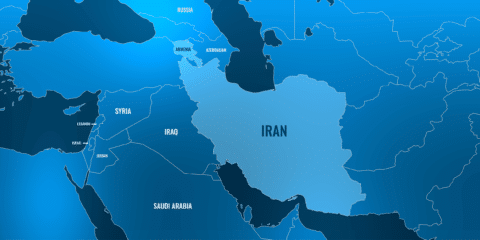Israel must take seriously Iran’s stated intention to destroy the Jewish state. Iran’s desire to attain nuclear weapons serves its goal of eliminating Israel and its strategy of using its proxies to threaten Israel’s civilian population. All measures taken so far to stop Tehran’s nuclear project have failed, and Israel has no choice but to urgently eliminate this threat by military means.
The war in Gaza and the attrition being waged against Israel’s residents in the north have diverted Jerusalem’s attention from its greatest security challenge – Iran’s rise in the Middle East, accompanied by a nuclear weapons program nearing a successful conclusion. Israel must not ease up in the face of the Iranian challenge.
Iran has always been an important country in the Middle East. It is a large country with a population of some 90 million. In the Middle East, only Egypt and Turkey have populations of this size. Iran has resources, mainly energy; it also has considerable technological capabilities. Iran, also called Persia, once established an empire that ruled the Middle East for centuries. This imperial legacy guides the steps of Iran’s political leadership to this day.
The Shiite Islamic Revolution of 1979 transformed Iran from a pro-Western country into an extremist Islamic state working to realize its religious vision throughout the Middle East. Iran seeks hegemony in the region and there are signs that it wants to extend this even further afield. Iran has become an active anti-American force. Likewise, in Tehran’s religious doctrine, Jews are destined to be second-class citizens in the Muslim sphere, and there is certainly no place for the existence of a Jewish state. The religious impulse to destroy the Jewish sovereign entity must be taken seriously.
Tehran’s campaign against Israel also stems from strategic reasons. In today’s Middle East, as the United States tries to disengage from the region in order to concentrate on the Chinese challenge, Israel is the only country capable of standing up to Iran’s hegemonic ambitions. No Arab country can resist its rising power. The Arab states suffer from serious domestic problems and lack the military and political ability to stand up to revolutionary Iran. This, of course, is the main reason for the rapprochement with Israel and the signing of the Abraham Accords. In fact, Israel is a strategic enemy and not just a theologically intolerable political entity.
Turkey, a strong country contending for supremacy in the region and the Muslim world, is also hesitant to take a clear stand against Iran. This is mainly due to the caution that characterized relations between the two empires in the past, and the Islamic identity of Turkey’s contemporary leadership.
Iran’s intentions vis-à-vis Israel are clear, as its strategy for the destruction of the state. Tehran understands that it cannot defeat Israel in a conventional war. The Iranians have concluded that Israel’s weak point is Israeli society. Hezbollah leader Hassan Nasrallah’s “spider’s web” speech (May 2000) echoed Iranian thinking in this respect. Nasrallah compared the power of the State of Israel to the power of a spider’s web. Israel looks strong from the outside, with great military might, technological superiority and nuclear weapons, but like a spider’s web is easy to destroy and subdue. This, in the Iranian/Hezbollah thinking is because Israeli society will not be able to withstand constant terrorist attacks, attacks and rocket fire. According to this view, Israeli society is tired of wars and does not have the strength to withstand a bloody struggle and suffer casualties; they believe that parts of Israeli society will leave the country in the face of such pressures. Therefore, the strategy of Iran and its proxies in the region is directed against Israel’s population.
Iran has been highly successful in establishing armed sub-state organizations in several Middle Eastern countries to serve its foreign policy objectives. It has succeeded in establishing a “ring of fire” around Israel, i.e., bases for launching missiles into Israeli territory. Iran has developed the ability to manufacture missiles of all types and is supplying the missiles, the technology for their production, and training for its proxies. This situation also allows room for denial, so as to avoid direct military confrontation with Israel and/or the United States.
Pro-Iranian militias are located in Lebanon (where Hezbollah effectively controls the country), Syria, Iraq, Yemen and Gaza. The Iranian presence is also returning to Sudan, which is embroiled in a civil war. Through them, Iran strives for hegemony in the Middle East and the withering of Israel. The missile arsenal in the hands of Iran’s proxies is aimed from several arenas at Israel’s population, which, in their opinion, is the Jewish State’s weak point.
To a certain extent, the Iranian view is correct. We must not forget that the missile capability possessed by Hezbollah and Hamas managed to deter Israel, which, as a result, adopted a policy of containment in the Lebanese and Gazan arenas. This policy, whose essence is “quiet for quiet,” results in the adversary gaining time to build up his military power, and thus further erode Israeli deterrence. Israel’s policy of containment also confirmed the Iranian assumption that Israel is very sensitive to threats to the routine of the home front. Indeed, the October 7 Hamas attack is unmistakable evidence of the erosion of Israeli deterrence. A failure of deterrence also occurred in the Lebanese arena when Hezbollah joined the war – albeit at a low intensity.
The main motive for the Iranian nuclear project is not Israel, but in Iranian thinking it radiates on Israel. Seeing Israeli society as weak, a nuclear threat could be a catalyst for emigration from Israel. “Living in the shadow of the mushroom cloud” is liable to undermine the confidence of Israeli citizens in the state’s ability to protect them. The citizens of Europe and the United States were subject to a nuclear threat, especially during periods of tension in the Cold War, but this did not result in migration; the Iranians perhaps feel that in the Middle East things could be different.
Iran’s nuclear program stems primarily from defensive reasons. The nuclear project was intended to prevent an American invasion of Iran. In this context, we must remember that the United States invaded Iran’s neighbors: Afghanistan to the east and Iraq to the west. Nuclear weapons can be a deterrent. North Korea is not so afraid of a South Korean or U.S. invasion because it has nuclear weapons. The United States only intervened in Libya in 2011 after it had given up its nuclear program several years earlier.
Iran’s nuclear project also serves as a deterrent against the toppling of the regime. There is greater reluctance to toppling a regime that possesses nuclear weapons, as it is unclear whose hands the nuclear button will fall into. During President George W. Bush’s crusade for democracy, the U.S. left Pakistan alone, most likely because it had nuclear weapons. The chances that these weapons could fall into the hands of Islamic elements were not small. Ukraine may have made a mistake by giving up nuclear weapons at the end of the Cold War, as with such weapons it may have been able to prevent the Russian invasion.
The nuclear project also provides backup for the ring of fire that the Iranians are creating around Israel through their proxies. In other words, Iran’s proxies can adopt a more aggressive policy when they have an Iranian nuclear umbrella, and it is thus easier for them to resist the fear of a severe Israeli strike. Iranian nuclear capability may deter Israel from escalating and taking harsh military measures.
The nuclear project, of course, also serves Iran’s aspiration for regional hegemony. Iran’s neighbors – who do not possess weapons of mass destruction – will be more responsive to requests from nuclear-armed Iranians.
All attempts, especially by the Americans, to stop the nuclear program have failed. Economic sanctions are ineffective. This failure results from choices made by statesmen who shirk from taking serious action. Sanctions did not help against Saddam Hussein, against Fidel Castro, and they are not efficient in the case of Vladimir Putin. A country determined to achieve its goals is willing to pay great costs. Moreover, a dictatorship like the regime of the ayatollahs does not care if its citizens go hungry. Those in power eat well even when there are sanctions.
In the shadow of the sanctions, there were also attempts at diplomacy; in 2015, Tehran and the P5+1 signed the JCPOA aimed at limiting Iran’s nuclear progress. This flawed agreement legitimized Iran’s uranium enrichment program to obtain fissile material for an atomic bomb. Under the terms of the agreement, restrictions expired on uranium enrichment expired after several years. The Biden administration tried to achieve a better deal but failed.
There is no doubt that covert operations, especially by Israel, delayed the completion of the Iranian nuclear project, but they have not stopped it and it is becoming increasingly clear that only kinetic action has a chance to stop Tehran’s advance to the bomb. This is the only effective alternative remaining after a quarter of a century of efforts on several dimensions.
Moreover, the United States cannot be trusted to act militarily to prevent Iran from reaching the bomb, no matter which president sits in the White House. The Biden administration is doing everything not to confront Iran, including preventing an American ally from winning the war against Hamas. Even if Donald Trump returns to the White House, no decisive action can be expected from him on the Iranian issue. Trump is largely an isolationist who reflects the mood in the United States and its aversion to military adventures overseas.
The obvious question that arises from this situation is whether Israel can deter Iran from using nuclear weapons it might come to possess against the Jewish state. If both countries have nuclear weapons, it will be difficult to maintain a stable balance of deterrence, contrary to the claims of some irresponsible academics. In general, it is difficult to imitate the relationship that existed between the two nuclear powers, the Soviet Union and the United States. Creating a stable “balance of terror” is very problematic in the Middle East. We must take into account that a situation where two sides have nuclear weapons is similar to two gunmen facing each other: The fastest to draw is the winner. Mutually assured destruction can work when both sides have a “second-strike force,” that is, the ability to inflict unacceptable damage on the other side despite the nuclear damage it has suffered. Thus a second-strike force deters the other side from initiating nuclear war. Building a second-strike force is a complex matter that is fraught with uncertainty. Moreover, it depends on sensitivity to cost. In the Middle East, the Iranian revolutionaries are willing to pay a high price. What constitutes unacceptable damage for the mullahs? They are willing to endure a lot of pain, and they have said they are willing to sacrifice millions of Iranians to destroy the Jewish state.
Moreover, contrary to claims made in the professional literature, the fact that two adversaries possess nuclear weapons does not freeze conflicts and does not prevent wars. For example, both India and Pakistan have nuclear weapons but that did not prevent war between them in 1999. It is possible to imagine a scenario that would lead to the use of nuclear weapons in the event that the regime in Iran is in danger from a coup or revolution. The current regime understands that in such a case it and its supporters will be thrown out onto the streets and treated like they have treated their political opponents. In that scenario, perhaps someone will be tempted to realize the vision of destroying Israel and will press the button as they know they are doomed to death: “Let me die with the Philistines” as it were. There is after all, no shortage of suicide bombers in the Muslim world.
There is another complication to allowing Iran to continue its nuclear project: The Gulf states and other Arab countries, seeing Iran’s might, may choose to switch to Tehran’s side. In international relations, such behavior is referred to as “bandwagoning.” The agreement between Iran and Saudi Arabia under China’s auspices may be the beginning of such a step. The possibility exists that the Abraham Accords, which are based on an alignment between Israel and the Gulf states, against Iran, could be cancelled. It is also unclear what Jordan or Egypt will do if Iran acquires nuclear weapons. Another complication, which is very problematic, is the emergence of a multipolar nuclear Middle East. In the event that Iran acquires nuclear weapons, it is unlikely that Turkey, Egypt, and Saudi Arabia will not try to follow Tehran’s lead. A multipolar nuclear Middle East is a strategic nightmare for Israel; it must be prevented.
Urgent military action against Iran’s nuclear project is required. After October 7, it is hard to trust Israeli intelligence to provide warning when there is still time to act. Therefore, military action must be taken as quickly as possible. The Iranians are acquiring uranium enriched to a level suitable for nuclear weapons. We know that at the same time they are also working on the technical aspects of weaponization and fitting a warhead on its missiles. It is unclear when these processes will be completed, but time for military action appears to be running out.
Regional dynamics and Israel’s existential necessities must lead to a preventive strike against Iran. Israel did so in 1981 against the Iraqi reactor and in 2007 in Syria. In 2019, IDF Chief of Staff Aviv Kohavi established the Third Circle Directorate to deal with the Iranian threat. All necessary resources must be provided to this command. In addition, the IDF must train to fulfill the most important task facing the State of Israel since its establishment. Hopefully, Israel will act to save us from the dangers of Iran’s nuclear program.
JISS Policy Papers are published through the generosity of the Greg Rosshandler Family.
Photo: Shutterstock









 - בניית אתרים
- בניית אתרים